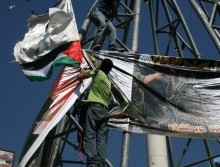 Last month saw a flurry of diplomatic activity surrounding the Palestinian pursuit of United Nations membership. World leaders made speeches on the topic, rhetoric was in full effect and both sides repeatedly promoted their positions to the media. Now, however, an eye of the storm-like calm is settling upon the situation.
Last month saw a flurry of diplomatic activity surrounding the Palestinian pursuit of United Nations membership. World leaders made speeches on the topic, rhetoric was in full effect and both sides repeatedly promoted their positions to the media. Now, however, an eye of the storm-like calm is settling upon the situation.
Based on the international response so far, the Palestinians find themselves in a corner. The powerful Mideast Quartet has called for resuming peace talks without preconditions and the Palestinian statehood recognition bid is in a UN committee where it remains unclear how long until a vote will actually take place. This isn’t what the Palestinians expected.
The Palestinian goal was simple: force the United States to veto the application in the Security Council and isolate Israel and the Americans. Then turn that into momentum that carries forward a legal and diplomatic assault on Israel to pressure them further.
Instead, the Security Council hasn’t been the rubber stamp the Palestinians had hoped it would be. They need nine yes votes to force the American veto, which they are still trying to reach. And they might not get them.
An Israeli official told The Mideast Update that he felt the Palestinians were surprised the traditional UN automatic endorsement didn’t hold this time around. When combined with the potential holding-pattern in the Security Council, the vote uncertainty seems to have provided the sides time to catch their breath. The break-neck tension that marked the days leading up to the UN General Assembly meetings appears to have passed—for now anyway.
The other “surprise” for the Palestinians according to the Israeli official was the Quartet statement calling for peace negotiations without preconditions. The Quartet represents a powerful chunk of the UN Security Council—including the UN itself, the US, Russia and the European Union. Altogether, four of the five Security Council veto powers (US, Russia, UK, France) are members of the Quartet.
That doesn’t mean the Russians are going to oppose the Palestinian UN move. But it does increase the pressure on the Palestinians, who—as the Israeli official put it—are in many ways “uncharacteristically isolated” these days.
The Palestinians aren’t helping themselves by refusing to officially accept the Quartet plan, which the Israelis have done.
While both sides have concerns about the Quartet approach, which ambitiously calls for progress on borders and security in six months and a final deal by the end of next year, the Israelis said they’d raise their concerns “at the appropriate time.” As the Israeli official said, they will raise their concerns “as this process moves forward, but we want this process to move forward.”
The Palestinians, on the other hand, are sticking to their preconditions of an Israeli halt to settlement construction and acceptance of the 1967 lines as the basis for talks. As the roadblock to getting the talks resumed, the Palestinians are isolating themselves from some key world powers, instead of isolating Israel.
The Quartet’s proposal, issued shortly after Palestinian President Mahmoud Abbas’ UN speech, effectively stole the wind from the Palestinian sails. And when combined with the caution in the Security Council, the situation appears to have slowed the escalating tension that could have eventually sparked Middle East violence.
So now is the respite from the diplomatic frenzy and a surprising calm from what could have been chaos had the Palestinian UN bid led to a US veto, then to diplomatic and boycott moves against Israel and possibly worse.
But what’s next? The Quartet’s incredibly vague statement may have left room for the sides to resume negotiations in the next three weeks. If they agree to the “preparatory meeting” to discuss the framework for renewing talks, the Palestinians may be able to convince the flexible Israelis to agree to some version of their preconditions.
The Palestinians can claim actual talks didn’t start until their conditions were met. The Israelis can claim that they worked out compromises in direct negotiations with the Palestinians. Both sides save face, even if Israel again ends up doing most of the compromising.
Israel certainly hasn’t come out of the situation unscathed. Pressure is already mounting and will likely only increase. And if the Israelis agree to any of the Palestinian preconditions in any form they will be giving away important ground in negotiations.
So this is not an endorsement of that approach or of the Quartet statement. In fact they may just be setting up a disaster in the next year or so. But it still could have been worse now for Israel, the US and the quiet in the region. Much, much worse.
Of course, the expectation that the sides will get back to talking doesn’t mean a deal by the end of 2012 is going to happen… it just means that things aren’t likely to explode just yet.
In other words, this really is the eye of the storm. Until the Palestinians finally accept Israel’s legitimate claim and right to exist in the region and promote peace with them, more thunder and lightning is forecasted on the horizon—so enjoy the calm while you can.
(By Joshua Spurlock, www.themideastupdate.com, October 3, 2011)
